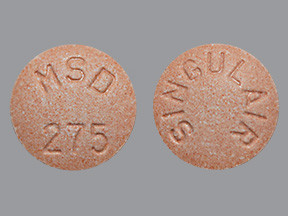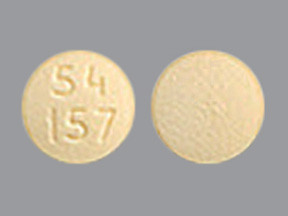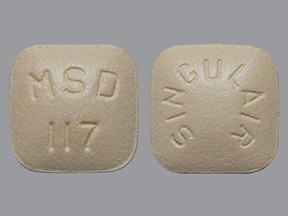MONTELUKAST - ORAL
PHONETIC PRONUNCIATION: (mon-teh-LEW-kast)
COMMON BRAND NAME(S): Singulair
GENERIC NAME(S): montelukast sodium
Uses
USES: Montelukast is used regularly to prevent the wheezing and shortness of breath caused by asthma and decrease the number of asthma attacks. Montelukast is also used before exercise to prevent breathing problems during exercise (bronchospasm). This medication can help decrease the number of times you need to use your rescue inhaler. This medication is also used to relieve symptoms of hay fever and allergic rhinitis (such as sneezing, stuffy/runny/itchy nose). This medication does not work right away and should not be used to treat sudden asthma attacks or other breathing problems. This drug works by blocking certain natural substances (leukotrienes) that may cause or worsen asthma and allergies. It helps make breathing easier by reducing swelling (inflammation) in the airways.
How to use MONTELUKAST - ORAL
HOW TO USE: Read the Patient Information Leaflet if available from your pharmacist before you start taking montelukast and each time you get a refill. If you have any questions, ask your doctor or pharmacist. Take this medication by mouth with or without food as directed by your doctor. The dosage is based on your medical condition and response to treatment. If you are using the chewable tablets, chew them thoroughly before swallowing. If your child cannot safely chew and swallow them, consult the doctor or pharmacist for advice. Take this medication at the same time each day. If you are taking this medication for asthma or for both asthma and allergies, take your dose in the evening. If you are taking montelukast to prevent only allergies, take your dose either in the morning or the evening. If you are taking this medication to prevent breathing problems during exercise, take your dose at least 2 hours before exercise. Do not take more than one dose in 24 hours. Do not take a dose before exercise if you are already taking this medication daily for asthma or allergies. Doing so may increase the risk of side effects. Do not increase or decrease your dose or stop using this medication without consulting your doctor. Continue to use this medication regularly to keep your asthma under control, even during sudden asthma attacks or periods when you have no asthma symptoms. Continue to also take other medications for asthma as directed by your doctor. This medication works over time and is not meant to relieve sudden attacks of asthma. Therefore, if an asthma attack or other breathing problem occurs, use your quick-relief inhaler as prescribed. You should always have a quick-relief inhaler with you. Consult your doctor or pharmacist for more details. Get medical help right away if your asthma symptoms worsen and your quick-relief inhaler is not helping. Tell your doctor promptly if asthma symptoms, breathing problems, allergy symptoms, number of times you use your rescue inhaler persist or worsen.
Side Effects
Precautions
Interactions
Overdose
Images

- color
- pink
- shape
- oblong
- imprint
- MSD 711, SINGULAIR

- color
- pink
- shape
- oblong
- imprint
- MSD 711, SINGULAIR

- color
- pink
- shape
- round
- imprint
- MSD 275, SINGULAIR

- color
- pink
- shape
- round
- imprint
- MSD 275, SINGULAIR

- color
- light tan
- shape
- round
- imprint
- 54 157

- color
- light tan
- shape
- round
- imprint
- 54 157
Reviews
Faq for MONTELUKAST - ORAL
Montelukast is a medication that belongs to a class of drugs called leukotriene receptor antagonists. It is used to prevent and manage asthma symptoms and to relieve symptoms of seasonal allergies.
Montelukast works by blocking the action of certain natural substances in the body called leukotrienes. Leukotrienes are responsible for causing inflammation, narrowing of the airways, and increased mucus production, which lead to asthma and allergy symptoms. By blocking leukotrienes, montelukast helps to ease breathing and reduce symptoms.
Montelukast is usually taken once daily, in the evening. It can be taken with or without food. The dosage and duration of treatment will depend on your condition and response to the medication. Always follow your doctor's instructions.
Common side effects of montelukast may include headache, stomach pain, sore throat, cough, diarrhea, and fever. If these side effects persist or worsen, contact your doctor.
Yes, montelukast can be used in children as young as 6 months old, depending on the specific condition and the doctor's recommendation. However, the dosage and administration may vary based on the child's age and weight.
No, montelukast should not be used as a rescue medication for sudden asthma attacks. It is not a bronchodilator and works best when taken regularly to prevent asthma symptoms. If you experience an asthma attack, you should use a quick-relief inhaler as directed by your doctor.
Montelukast may interact with certain medications, such as phenytoin, rifampin, and certain antifungal medications. It is important to inform your doctor and pharmacist about all the medications you are taking, including over-the-counter drugs and herbal supplements, to avoid potential interactions.
It is generally not recommended to stop taking montelukast abruptly, especially if you have been regularly taking it for a long time. Talk to your doctor before discontinuing the medication, as they may need to gradually reduce the dosage to prevent the recurrence of symptoms.
Montelukast may start working within a few days of starting the medication, but it can take up to several weeks to achieve its full effect. It is important to continue taking montelukast as prescribed by your doctor, even if you do not notice immediate improvement in your symptoms.
Disclaimer
IMPORTANT: HOW TO USE THIS INFORMATION: This is a summary and does NOT have all possible information about this product. This information does not assure that this product is safe, effective, or appropriate for you. This information is not individual medical advice and does not substitute for the advice of your health care professional. Always ask your health care professional for complete information about this product and your specific health needs.

No Reviews Yet